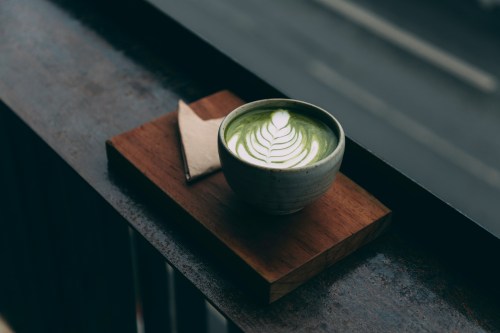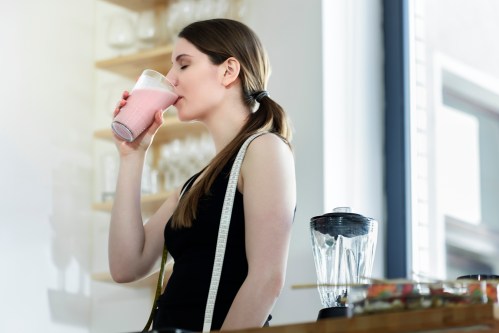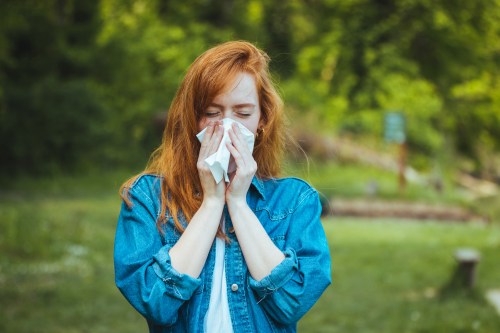If you’re among the millions of Americans taking antidepressants and you’re trying to optimize your health holistically, odds are good you’re taking at least one supplement in addition to your daily dose of depression-busting drugs. Seriously—popping a probiotic or magnesium capsule seems to have become as integral to one’s wellness regimen as daily meditation and a morning glass of lemon water.
Experts in This Article
osteopathic doctor board-certified in family and anti-aging medicine
associate professor of clinical pharmacy at USC
But when I recently told a friend I wanted to add primrose oil to my routine (which already included an SSRI) to help clear my skin, she told me to proceed with caution. There can be risks when it comes to taking antidepressants and herbal supplements.
There are whisperings in wellness circles, my friend said, that some supplements can interfere with your meds, thus rendering them ineffective. Uh—what? I needed to investigate.
Supplements to avoid when you’re taking antidepressants
Lisa Goldstone, PharmD, an associate professor of clinical pharmacy at USC, is quick to dish up some commonsense advice for your supplement habit: “Consulting with both your physician and pharmacist is recommended prior to adding any non-prescribed medications, supplements, or vitamins to one’s diet,” she says.
In my personal experience, however, traditional Western medical practitioners (e.g. psychiatrists) tend to err on the side of caution and recommend you abstain from all supplementation…just in case. Curious as to how necessary this really is, I press Goldstone to name names.
St. John’s Wort
“St. John’s wort is probably most well-known for interacting with many antidepressants as well as other medications,” Goldstone says.
‘When taken on its own, St. John’s wort has actually been shown to improve the symptoms of depression just as well as antidepressants can. But when taken alongside an SSRI, the supplement can cause serotonin syndrome—an overabundance of serotonin in the brain that can lead to fever, diarrhea, chills, and even seizures and death in serious cases.
So even though it might be tempting for people dealing with depression to add the mood-boosting herb to their regimen—the more help their brains can get, the better, right?—it’s best to stay away.
Vitamin K and vitamin E
Christopher Calapai, DO, a Long Island, New York-based doctor board-certified in family and anti-aging medicine, adds two other supplements to the no-go list for those taking depression meds: “Antidepressant medications [and possibly antipsychotic meds] may not be absorbed well if people are taking a lot of vitamin E,” he says. “Vitamin K may also decrease absorption of antidepressants.”
When I ask Dr. Calapai if this means that women on antidepressants should be wary of even multivitamins, he tells me I’m being overly cautious. Multivitamins, he says, are “extremely important for every part of the body” and should therefore remain in your medicine cabinet. However, he recommends that people taking antidepressants get their blood work checked regularly to make sure their vitamin E and K levels are within a healthy and safe range.
Tryptophan (5-HTP)
Tryptophan, also known as 5-HTP, is an essential amino acid we can get from food (think: tryptophan-rich foods like peanut butter and pumpkin seeds). It also comes in the form of a dietary supplement that can improve serotonin production, per Mount Sinai. An April 2020 review in the Journal of Dietary Supplements found evidence that taking tryptophan can decrease anxiety and increase positive mood in healthy adults.
The problem is, tryptophan supplements and antidepressants taken together can cause serotonin syndrome. (You’re still fine to eat foods with tryptophan, though!) Tryptophan also isn’t well-regulated by the FDA (fun fact: no supplements are), so it’s best to chat with your doctor before taking it.
S-adenosylmethionine (SAMe)
SAMe is a compound our bodies naturally produce to help with hormone production and regulation, and to maintain cell membranes, according to the Mayo Clinic. It also comes as an over-the-counter dietary supplement in the U.S., and in some countries you need a prescription.
SAMe could be considered a natural antidepressant, and it’s typically taken to treat depression, osteoarthritis, and/or liver disease. It can potentially replace your antidepressant (talk to your doctor about this, of course), but it shouldn’t be an add-on. It’s not recommended to take SAMe with antidepressant medications (yet another serotonin syndrome risk).
Mucuna pruriens
A psychiatrist warned me that mucuna pruriens (MP), aka “the dopamine bean,” was bad-news bears when taking an antidepressant. Dr. Calapai, meanwhile, tells me there’s simply not enough research on this buzzy supplement to safely recommend it as an adjunct or replacement therapy for depression. So, best to avoid this supplement while taking antidepressants.
Evening primrose oil
Finally, we come to the supplement that started me on the quest for this information in the first place: evening primrose oil (EPO).
Turns out, EPO and antidepressants together is indeed a no-go. Mount Sinai notes that EPO can interact with SSRIs including Lexapro (escitalopram), Prozac (fluoxetine), and Zoloft (sertraline). And for the record, it’s also not safe to mix it with blood pressure or blood-thinning meds, phenothiazines (used to treat schizophrenia), or seizure-managing meds.
What’s more, per the Mayo Clinic, research around EPO for benefits like easing eczema or PMS symptoms has been inconclusive at best. So it’s probably not worth risking any potential side effects.
Supplements that are safe to take with (and might enhance) antidepressants
Some supplements, meanwhile, have been proven to have the opposite effect: They make antidepressants work better. This doesn’t mean you should skip formal diagnosis and treatment (or stop taking your prescribed medication without first discussing it with your doctor or care team), but there could be ways to enhance the effectiveness of antidepressants by taking supplements for mental health.
Omega-3 fatty acids
By now you probably know the classic sources of omega-3s—salmon, walnuts, flax oil, and other fatty acid foods. Omega-3 fatty acids are probably best known for their heart-health benefits, but there could be a link to improving depression, too. Omega-3 supplements can possibly help treat depression, particularly depressive symptoms for people living with bipolar disorder, per the Mayo Clinic. But more research is needed to confirm its positive effects.
Taking antidepressants and omega-3 (or fish oil) supplements has no known adverse side effects.
Vitamin B12
Dr. Calapai says some studies have shown that B12 supplementation can safely work alongside antidepressants. A small November 2013 study in The Open Neurology Journal showed evidence of B12 supplements successfully decreasing symptoms in adults diagnosed with depression. This was tested again in a January 2018 study in The British Journal of Psychiatry, where researchers found B12 enhanced and sustained antidepressant effectiveness over the course of a year.
What to look for in supplements
Dr. Calapai and Goldstone offer this warning: In the scientific community, no news doesn’t necessarily mean good news. There might not be research to support a dangerous link between a certain supplement and antidepressant pairing today, but tomorrow there may be. “This makes taking any supplement risky,” Goldstone says. Plus, supplements are not approved by the Food & Drug Administration (FDA) and can vary in terms of quality.
Always talk to your doctor or health care provider before taking a new supplement. If you get the green light, look for a supplement that checks these boxes, which make it more likely to be a quality, safe product:
- Follows the FDA’s current good manufacturing practices (cGMPs)
- Has gone through third-party testing by USP, NSF, or Consumer Lab (most products will include a seal indicating this on their label)
When to see a doctor
Talk to your doctor to determine what supplements you can take with antidepressants. You never know how they could interact or interfere with each other.
You should also seek help for your depression symptoms if antidepressants stop working, or if symptoms are interfering with your daily life or causing distress, including thoughts of self-harm. To get immediate help for you or someone you love, call or text the 988 Suicide and Crisis Lifeline at 988 or chat online. And in life-threatening situations, call 911 ASAP.
—reviewed by Jennifer Logan, MD, MPH
Sign Up for Our Daily Newsletter
Get all the latest in wellness, trends, food, fitness, beauty, and more delivered right to your inbox.
Got it, you've been added to our email list.









